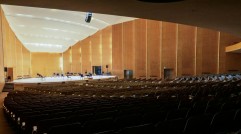'The Hobbit: The Battle of Five Armies' Movie Review: A Solid Ending to A Somewhat Disappointing Trilogy
There and back again.
The original "Lord of the Rings" films were always bombastic affairs that were anchored by the intimate relationship of the tiny inhabitants of Middle Earth known as the hobbits. Despite the high-flying adventures, audiences could always feel the comfort of knowing that their emotional connection would remain with Frodo, Sam, Merry and Pippin as they ventured to rid the world of all evil.
When all was said and done, it returned to where it began -- with the hobbits.
The new trilogy of Middle Earth films, adapted from the child's book "The Hobbit", were often lacking in this emotional cohesion and aim. Despite being based on more subdued and even intimate source material, this trilogy has often gone through an identity crisis as it tried to reconcile the lighter side of Tolkien's wondrous novel with the larger scale and tone of director Peter Jackson's original films. And so it is with the series conclusion "The Hobbit: The Battle of Five Armies," a film laden with violent gestures from its opening destruction of Lake Town to its lengthy titular title, which ultimately ends on the quietest of notes. A note barely glimpsed or heard in the trilogy's almost eight hours. And it is this moment of lightness, intimacy and nostalgia -- not the references to future events, images or characters -- that truly connects the "prequels" to Peter Jackson's original films.
As the viewer watches Bilbo, a man weary from his travels, staring at his ransacked home (the very same location in which Frodo's journey begins), there is a sense that the very experience has had a similar experience on the viewer. While certainly entertaining, there is always a feeling that these Hobbit films, and their often muddled execution have taken some of the sheen and luster off of the original films (in much the same way the prequel "Star Wars" films did to the originals).
In this context, "The Battle of Five Armies" is admittedly a showcase of both the best and worst of Jackson's own "prequelitis." Where the first film, which suffered from the severe realization that it lacked substance and material to be an almost three-hour film, was forced to pad its running time with plodding pace, songs and pointless action sequences, this film is the complete opposite. The opening assault on Lake Town by Smaug the dragon is a rushed affair that cuts so quickly that some of the visuals are rendered unwatchable (this is highlighted by the much-needed adjustment period to the ghastly 64 frames per second in 3D no less). There is no sense of tension in this sequence as the viewer struggles to find out where each character is coming from and going to. Without any doubt, this sequence would have gained a lot not only from being extended but from being placed in the last film "The Desolation of Smaug," where it belonged.
Once the prologue is finished the film starts to slowly finds its way, though it continues to stumble at a few pit stops. An unnecessary sequence in which Galadriel, Elrond and Saruman save Gandalf from the clutches of Sauron leads to another rushed action sequence that lacks any sense of danger for the heroes. Its only true function is to set up the relationship with Saruman and Sauron, which is ultimately pointless in the grand scheme of this narrative.
Remember how it was mentioned earlier that the hobbits were the emotional core of the original trilogy of films? Jackson has tried time and again to provide the dwarves with a similar function, but their large quantity has often made many indecipherable from one another. And yet this is the story in which Thorin Oakenshield is finally the centerpiece of the narrative and helps to put the film back on its feet. There were seeds of his selfishness planted in earlier films, but they finally bear dramatic fruit in this one. His lust for power has turned him into a violent monster who distrusts his own kin and is obsessed with finding the infamous Arkenstone. Richard Armitage, who plays Thorin, continues to steal the show as the omnipotent and omnipresent dwarf. One must forgive some of the exaggerated speech (unfortunately Jackson, who was solid at using slow-motion technique in his first trilogy for poetic depiction, has overstepped the boundaries of indulgence at times) in which he tells Bilbo of his desire to destroy the traitor because it is the only pitfall in his performance. Once he eventually goes through his emotional trial and reaches his epiphany, Thorin retains the heroic stature that made him the trilogy's true hero.
That unfortunately means that poor old Bilbo, the trilogy's eponymous character, is further relegated to the sidelines. Martin Freeman is still peerless at balancing Bilbo's comic timing with his vulnerability, but his impact has diminished throughout each film as the hobbit has become more and more of supporting character in his own story. While he has his share of important dramatic beats in "The Battle of Five Armies," it is very telling that, when the battles reach their zenith, he is knocked unconscious and has no further input into the outcomes.
The titular battle is awash with solid visual effects and represents the most intensely engaging moment of the entire trilogy. Jackson has always known how to stage epic battles in Middle Earth, and while this one could have usually used less CGI monsters and more people in makeup (like in the original films), there is no doubt that the epic nature still remains exemplary. Of course, the private arena is always more emotionally engaging than the public one, and this holds especially true in the big confrontation between Thorin and his nemesis Azog.
The film reverts to a lot of clichés, particularly in relation to Bard (Luke Evans) and the humans. These are among the most cringe-inducing moments, and it is revealing that the least interesting characters in the film are in fact humans. Ryan Gage's Alfrid is unfortunately the most insufferable of characters as the constant attempts at making him a comic character wind up turning into fastidiously predictable behaviors that have been glimpsed in other films. He is an attempt at a lighter Grima Wormtongue but is far from as successful a rendition as that character. This has nothing to do with Gage, but simply the poor writing for the character.
Legolas (Orlando Bloom) and Tauriel (Evangeline Lilly), who brought some unique and unpredictable emotional dynamics to "The Desolation of Smaug," are relegated to little more than action heroes, and Tauriel's interspecies romance with Kili is never as truly riveting or fulfilling as Jackson intends because of its predictable nature. That Tauriel, a character that Tolkien never conceived, becomes a massive plot hole when analyzing the connections with "The Lord of the Rings". an indication of untidiness in the screenwriting.
Subtext in the dialogue has never been the franchise's strong point, and while a lot of the dialogue reverts to throwaway and redundant lines, such as when Smaug threatens to destroy Bard, credit must be given to Jackson and company for showing some restraint. Kili does not utter the words, "I love you," in English but in his native tongue, taking some of sappiness out of the moment and making it more resonant. Even at the end when Thranduil mentions Aragorn, he does not mention his true name but instead opts for a clever "his true name you will have to discover for yourself." More of this kind of finesse would have elevated the film further, but the little restraint showcased is ultimately much appreciated.
It must be said that for a film based on a children's book, this is arguably the most violent of Jackson's Tolkien adaptations. There are a number of deaths, and none are done without some sort of gruesome visual. It makes for a wrenching experience, especially since the fallen are some of the most important characters.
It is probably a positive that despite its grandness, "The Battle of Five Armies" is actually the most intimate of the three films. Despite the arrival of new and ultimately uninteresting characters (Thorin's warrior cousin for example) and the fact that it never manages to draw the viewer in the way the originals did, the battle for Thorin's soul and his relationship to Bilbo and the others gives the viewer the most visceral emotional connection of the trilogy.
All in all, "The Hobbit: The Battle of Five Armies" is a fitting conclusion to the Middle Earth prequels. It has become clear that Jackson has followed in George Lucas' footsteps to a T with a shift in the quality from one trilogy to the next. But fortunately like Lucas' prequel "Star Wars" films, which got better and better, "The Hobbit" has followed that same path. For those looking for great spectacle and one final chance to connect with the characters, this film is as good as it gets. That it is the shortest of the Middle Earth films is a big plus.
Unlike the other final trilogy installment, "The Return of the King," this film does not feature a million epilogues that so clearly reveal a reluctance to leave the world and its characters. "The Battle of Five Armies" almost runs away rather quickly. And in many ways, it is fitting. The trilogy as a whole has its moments that resemble the grandeur of the original film while never really reaching that level. That it ends on a nostalgic note seems to grasp for what could have been with these films. It was a fun ride, if somewhat of a disappointing one.
Subscribe to Latin Post!
Sign up for our free newsletter for the Latest coverage!












